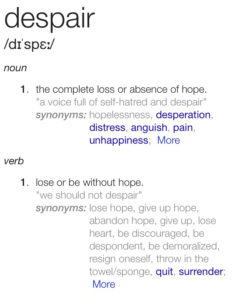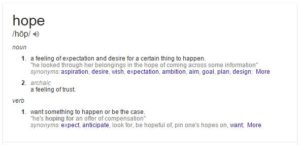“Living my life in a slow hell. Fueling up on cocaine and whiskey. Fueling up on heartaches and cheap wine. I was headed to church – I was off to drink you away.” – Kid Rock & Sheryl Crow
I recently watched a Wall Street Journal Moving Upstream video titled, “Warning Signs: A theory of America on the Edge.” It featured Sir Angus Deaton and his wife Anne Case as they discussed their research at Princeton on what is behind the rise of suicide rates in America. They presented a provocative case. Suicide rates for white people in America have been on the rise since 2002 and are now at a staggering 50-54 deaths per 100,000 individuals. When asked by host, Jason Bellini, for reasons why this phenomenon is happening, the scholars started by explaining that we have a spiritual crisis that is particular to North America. Anne quantified this as perpetuated by the Evangelical Church in America and their focus on a personal relationship with God as a Savior as opposed to other denominations (Catholics, for instance) who are more socially inclined and focus less on “religious observance.” They specifically talked about a “spiritual migration” indicative of the way churches change the way faith connects in the community. Namely, they are not positively contributing as they have in the past.
 At the very end of the show, Mr. Bellini asked the viewer, “Is the isolation and despair of so many people in this country pushing us toward some sort of crisis?” It is a question we can’t ignore.
At the very end of the show, Mr. Bellini asked the viewer, “Is the isolation and despair of so many people in this country pushing us toward some sort of crisis?” It is a question we can’t ignore.
Sir Angus Deaton connected suicide and opioid addiction as close to the same thing and so I turned to another Moving Upstream video where I watched heroin addict, Hannah Goldsberry, discuss her need for medication assisted treatment after her fourth near-fatal overdose. Curiously, she began her story discussing depression, even as the doctor responsible for her treatment said, “We’re not going to talk about that right now” and went on to talk about pharmaceuticals. I’m not discounting the need for people who suffer from depression to seek help from medication, but I would like to suggest that real and lasting hope for those who suffer does not come from a pill.
But what is this hope of which I speak?
I recently watched a Laura Ingraham “interview” on the use of the words “In God We Trust” which are prominently displayed in City Council chambers in the City of Wentzville, Missouri. Laura interviewed a St. Charles County resident, Sally Hunt, an avowed atheist, regarding her stance on the separation of church and state and her insistence that the words “In God We Trust” be removed because she and other atheists find them offensive. From the very outset of the interview Laura and her guest, Bob Onder, sneered at Sally, and it became clear (at least to me) that Laura only had her on only to humiliate her position. I find this disrespectful exchange very prevalent in society at large. Each person takes a stance on their personal position and defends it by insulting the person of opposing belief. This usually manifests in name calling, bullying and hateful vitriol by both parties because neither are willing to say, “we agree to disagree” by respecting the other person’s belief system. This particular discussion inevitably lead back the writers of the American Constitution and their perceived intent when they wrote it. It seems that all laws, even the American kind, begin with some sort of want for civil order, and suggest that in order to have civilized society, we need to abide by them.
Why do I mention this discourse? Because, and no disrespect to Sally Hunt and other non-believers, I don’t know how human beings can hope without faith in a God that created all things.
I think despair is often the result of intense longing; the response to a perpetually broken heart. I would like to postulate that the only true antidote to despair is hope, but not hope in the traditional way that people think of the meaning of the word.
A friend of mine recently entered into discourse with me on the meaning of hope. She said, “Hope has actually been redefined by people (and even the dictionary) to mean its exact opposite. People use the word hope in a way that implies uncertain possibility and they say it in the spirit of doubt most of the time. The dictionary actually wrongly defines it as a desire with expectation, which gives the impression that it is comprised of two different entities that might not work together for the desired outcome.” She goes on to say that she would like to redefine hope as “the joyful expectation of desire fulfilled” which “should only ever be used in the spirit of confidence and true belief as opposed to an uncertain and doubtful spirit and sometimes even in resignation.”
The dictionary actually wrongly defines it as a desire with expectation, which gives the impression that it is comprised of two different entities that might not work together for the desired outcome.” She goes on to say that she would like to redefine hope as “the joyful expectation of desire fulfilled” which “should only ever be used in the spirit of confidence and true belief as opposed to an uncertain and doubtful spirit and sometimes even in resignation.”
I want to ask an honest question, what do atheists and agnostics hope for?
I am a Christian. By that I mean that I follow the teachings of Jesus Christ. I believe God created the world and that Jesus, who was God, entered into the world to save condemned sinners from eternal separation from him. I perceive God as just in condemning our sin because we have broken the ten laws he gave us (the Ten Commandments). Jesus offered forgiveness from these sins as long as people believed that he was God in order to be saved from (eternal separation from Him) hell. He then commands those who believe in and love him to go out into the world and do good deeds—not that they might be saved—they are already saved, but because of their love for him, in order that those good works would inspire hope in the hearts of despairing people and that they too would believe in him and accept his love and forgiveness.
Jesus Christ is why I hope. He is the promise of all that is good in the world. He condemns murder, envy, disregard of parents and even adultery; in essence, all that is wrong (causing so many broken hearts) in modern society. But, amazingly, He also says he will pardon us for disregarding the laws laid out at the beginning of the world because of his deep love for human beings. He is a paradigm of holy contradiction, going so far as to willingly die for those who offended him most. Therefore, Christians (those who follow his teachings and aspire to be like him) must willingly do the same, something St. Francis of Assisi aspired to do.
Many self-proclaimed “Christians” misinterpret the true gospel (which means good news) as mere rules to be kept (much like the Pharisees of Jesus day) and many atheists and agnostics perceive their hypocrisy and hate them for it. The spiritual crisis contributing to our social crisis of despair is one and the same. Human beings are by nature self-concerned creatures who do not love God nor want to know him. They exist in a prideful state whereby they believe they are self-sustaining and therefore in control of their destinies. They have no reason to hope outside of themselves until pain—via a broken heart or body—causes them to recognize their complete helplessness and begin to search outside of themselves for the antidote to despair. In the midst of this they harm their fellow humans in a multitude of ways.
For that reason I believe Sir Angus Deaton is right that the evangelical church has contributed to the breakdown of spiritual social society in America. How will people find or experience God if the people who claim to know Him are self-righteously hateful? Jesus fundamental message was one of love and hope. He physically healed sick people and offered forgiveness to those who were sick at heart. And, importantly, while America claims to be “one nation under God” we have not evidenced it by our actions; namely, we have not loved well. And, much like Robin Williams, who spent his life entertaining and putting on a show, we are on the inside despairing, and therefore we commit suicide at an alarming rate.
For this reason alone I believe Sally Hunt is right to criticize our use of “In God we Trust.” But if given the chance, I would ask her… For all your passionate insistence in the right to believe God does not exist, and your striving not to be offended by those who do, where is your love for other people? Where is your kindness for those in your community? How are you making the lives of those around you better with your message? You believe we should all be entitled to unrestricted sex, but R. J. Ritche (Kid Rock) proves via his song “Picture” that sex and love are not synonymous and in fact contribute to broken hearts. Please show me your cure for the broken heart when even Sheryl Crow suggests it can be found in church.
Despair is a real problem in America, as evidenced by the newspaper headlines. At the same time, human beings continue their pursuit of pleasure, proving only that it is a mediocre distraction from our real affliction. I may convince no one with my pitiful attempt to mitigate despair with hope, but I will not “go gentle into that good night,” but instead continue to point to the way, the truth and the light.
 I Peter 1:20 “He was foreknown before the foundation of the world but was made manifest in the last times for the sake of you who through him are believers in God, who raised him from the dead and gave him glory, so that your faith and hope are in God.
I Peter 1:20 “He was foreknown before the foundation of the world but was made manifest in the last times for the sake of you who through him are believers in God, who raised him from the dead and gave him glory, so that your faith and hope are in God.
Hebrews 11:1 “Now faith is the assurance of things hoped for, the conviction of things not seen. For by it the people of old received their commendation. By faith we understand that the universe was created by the word of God, so that what is seen was not made out of things that are visible.”


Leave a Reply